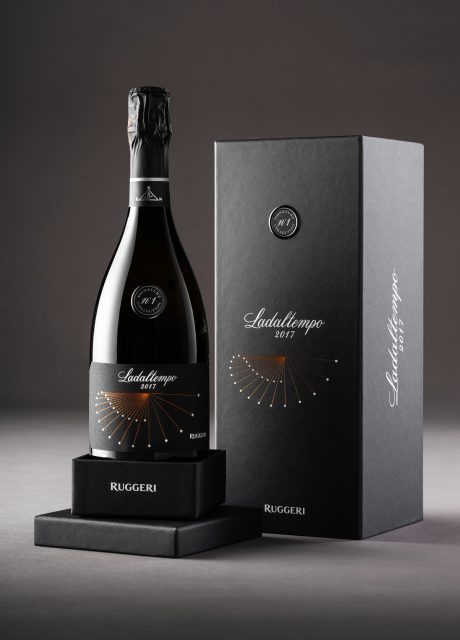This website uses cookies so that we can provide you with the best user experience possible. Cookie information is stored in your browser and performs functions such as recognising you when you return to our website and helping our team to understand which sections of the website you find most interesting and useful.
Ruggeri gives Prosecco packaging a twist
At this year’s ProWein, Ruggeri unveiled the patented packaging for its newly-released Ladaltempo, a premium Prosecco that is “entering the price point of Champagne”.

Meaning ‘beyond time’, Ladaltempo is a 100% Glera Valdobbiadene DOGC from the 2017 vintage which spent 60 months on the lees from spring 2018.
Ruggeri export manager Gianni Zucchetto described Ladaltempo as “a summary of what our winemaker believes. Glera as a grape can not only be used for fresh, young wines – you can get a higher quality product if you handle it correctly. Ladaltempo was made from grapes harvested around the area of Valdobbiadene, in Santo Stefano in particular.”
“When the winemaker decides to make a limited edition like this, we start off with a good harvest,” Zucchetto shared. “2017 was considered a good harvest in Valdobbiadene, and for that reason even before the project came to mind, there were already some batches of Prosecco left aside for additional maturation. We started thinking about doing this around two years ago.”
“Five years on the lees allowed the wine to gain structure and complexity, and in spring 2023 we bottled it, and in June we launched it in Italy.”
Tasting notes for the wine itself include dried apricot, dried fig, white peach, jasmine, chamomile and vanilla.
Thinking inside the box
“The packaging is all about time, with the label showing a sundial,” explained Daniela Ziegler-Scapin, marketing and communications manager for Ruggeri.
“The internal team at Ruggeri worked with packaging design company Pozzoli, which works on a lot of gift boxes in Italy,” she added.
The sleek black box it comes in is unlocked by twisting the upper portion, enabling it to be slid off, revealing the bottle, perched on the base, within.
“As it’s cardboard, it is recyclable, though with packaging like this we assume that the end consumer will keep it,” Ziegler-Scapin suggested. “We also have a wooden case, which is in the same design.”
“The price it has is important for a Prosecco – it’s entering the price point of a Champagne,” Zucchetto argued, pointing to its €45 price tag in Italy.
Overall, only 5,000 bottles of Ladaltempo were produced, with 400-500 magnums, though Zucchetto revealed that half of this amount has been sold already through Ruggeri’s own wine club and in-house hospitality, with a portion set aside for foreign markets.
“We wanted it to be available in our main export markets too, so we shipped it to the US, UK and Germany, and then a few other markets in Europe,” he shared. In the UK it is distributed through Enotria & Coe.
Asked whether this first edition will be followed up, Zucchetto said: “There will be a second edition, there will be a third edition, but this wine line is not tied to any concept in particular – it’s not tied to 60 months of ageing, or a particular vineyard. It’s tied to what our winemaker and the team think is a good wine to release as a limited edition – it could be in two years time, it could be in three years, there’s no specific timeline.”
Ziegler-Scapin revealed that one constant will be this packaging style, but Ruggeri “might play with colours and other small elements” of the design.
Premiumisation
Zucchhetto that encouraging consumers to trade up to a more premium Prosecco is a “daily struggle”: “We have two DOC wines, and all the rest is DOCG, so Ruggeri as a winery is mainly focused on the mid-premium segment of the market, whereas most consumers are buying in the low-mid price point range. We’re selling towards specific niches of the market that appreciate and know the difference. Everything we do is aimed towards increasing the prestige of Prosecco around the world – we wouldn’t be doing Ladaltempo, or vintage editions of wines such as Giustino B. Valdobbiadene Prosecco Superiore, if we didn’t believe that.”
“I think that after Covid, the perception of quality increased in markets such as Italy and Germany,” Ziegler-Scapin suggested. “Consumers were more focused on small details when having an aperitivo at home due to the on-trade being closed, and as a distraction from what was happening. People care more now about where products come from. In the aftermath of Covid we noticed there was more interest in quality – the problem now is with inflation and cost increases, so people have less disposable income, so people may still be interested in quality, but a lower quantity.”
As part of the push to premiumise Prosecco’s image in the UK market, the Consorzio Tutela Prosecco DOC launched its This is not Prosecco marketing campaign last year.

